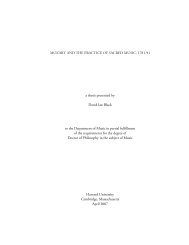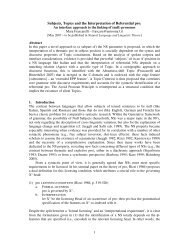draft of November 2011
draft of November 2011
draft of November 2011
You also want an ePaper? Increase the reach of your titles
YUMPU automatically turns print PDFs into web optimized ePapers that Google loves.
You will need a skirt sewn in India/ a clean skirt.<br />
c. ehi arosto pedhi/ehi psilo gkomeno<br />
has ill child/has tall boyfriend<br />
S/he has an ill child/a tall boyfriend.<br />
Discourse transparency Finally, bare nouns can introduce discourse referents (31), that<br />
is, they can be discourse transparent (Farkas and de Swarts 2003), a fact which, as pointed out<br />
by Kolliakou (2003), indicates that D is not necessary in Greek for referential interpretations.<br />
(31) telika vrike dada; ti gnorisame htes sto parti tis<br />
finally found-3sg nanny; her.cl met-1pl<br />
Yotas<br />
Yota-gen<br />
yesterday at-the party the-gen<br />
He finally found a nanny; we met her yesterday at Yota’s party.<br />
The facts reviewed so far indicate that bare nouns in Greek are fully fledged arguments<br />
both in terms <strong>of</strong> their morphosyntax as well as their semantic interpretations. In addition,<br />
the contrasts with Catalan, clearly indicate that not only plurals, but singular bare nouns<br />
have Number. We have to assume then that these nominals are minimally Number Phrases<br />
(alternatively, they can be Noun Phrases necessarily marked for Number).<br />
The next question is whether we should assume a null D head above NumP. Our answer<br />
is negative. The first set <strong>of</strong> facts arguing against a null D comes from scope.<br />
Scopal inertia Greek bare nouns exhibit the scopal inertia standardly exhibited by their<br />
crosslinguistic counterparts (Chierchia 1998; Farkas and de Swarts 2003).<br />
Examples involving the indefinite article like (32b) and (33b) are ambiguous: the former<br />
allows a transparent or de re reading and an opaque or de dicto reading while (33b) additionally<br />
allows the 3rd reading according to which Maria is looking for a specific type <strong>of</strong> Armani skirt.<br />
On the other hand, the bare nouns in the (a) examples allow only the opaque readings.<br />
(32) a. i Maria theli na padrefti Italo<br />
the-nom Maria want-3sg subj marry-3sg Italian<br />
Maria wants to marry an Italian. (only opaque reading)<br />
21
















